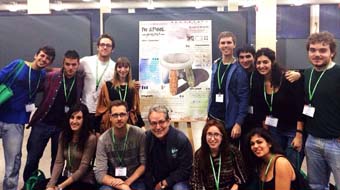
The Valencia/Biocampus team of the Univesitat de València, made up of 9 students, will present the ST2OOL project at the iGEM (International Genetically Engineered Machine) competition between 30 October and 3 November in Boston. The Valencia/Biocampus team is supported by the Sustainable Campus Programme, the Office of the Vice-Principal for Research, the Policies for Excellence Office, the Chair for Scientific Dissemination, the Scientific Culture Units (UCC+i), the Rector Peset Hall of Residence and the General Foundation of the Universitat de València, the biotechnological company Biópolis and the European Union’s ST-Flow, ERA-SynBio and Synenergene projects.
This year marks the tenth anniversary of the contest and 226 teams from around the world will participate in the Giant Jamboree to present their research in a symposium that will be the largest scientific event on synthetic biology ever carried out. The UV biochemistry and molecular biology professor Juli Peretó, who will act as judge in this 2014 special edition, says that “it is a real privilege to participate as a judge, for this will allow us to learn more about the internal functioning of iGEM”.
The team has been working during the summer with the support and supervision of 10 scientists and doctoral students who are also part of the team and have carried out different experiments and communication and dissemination activities, such as a video and an attractive website, for creating the project that they have named ST2OOL, a pun with the word stool, and which connects visually with the idea that these young researchers try to convey.
ST2OOL PROJECT
How solid are the foundations of synthetic biology? ST2OOL has tested four key building blocks of synthetic biology, namely, standardisation (ST), stability (ST), orthogonality (O) and open license (OL), which are precisely the basis of the iGEM contest. The goal of the project has been to critically review if these principles, considered dogmas of engineering, can be applied to human beings in the field of biotechnology. After carrying out a wide range of experimental tests, using numerous and different lab techniques as well as computational models, the results obtained suggest that the basic principles of engineering cannot be extrapolated to biological systems and, therefore, they have to be validated in each experimental application. That is why Manel Porcar, coordinator of the project and researcher of the Cavanilles Institute of Biodiversity and Evolutionary Biology of the UV, says that “the results are a reality check for any researcher wishing to work in synthetic biology as they clearly indicate that the basic principles of engineering cannot simply be applied to living cells”. The team members propose a solution: to continue exploring nature in search of biological components that behave in a more stable, standardised and independent manner, and for this they have built a robot that will help analyse DNA sequences obtained from a natural environment and which meet these criteria better.
The three key blocks —standardization, stability and orthogonality— have been studied in the bacterium Escherichia coli, which in turn, has proved to be a truly steady test bed for this type of experiments. However, the biological components tested (BioBrick parts) do not always behave normally and independently under a great variety of environmental conditions. “We have used proteomic techniques for checking that when a strange protein is produced in the bacterium the composition of the biological system does not undergo important alterations”, explains Porcar.
The fourth key block explores the problem of intellectual property and patents in the field of synthetic biology. It has been investigated if there is an intermediate point between free access (a basic principle of the iGEM community) and patentability, in order to maximise the social benefit and find a solution for communication problems between social scientists, engineers and experimenters. The idea is to provide the scientific community with the tools that make it easier for researchers to determine the patentability of their scientific discoveries. And the Valencia/Biocampus team proposes a mathematical formula that may help achieve this goal.
The members of the team are looking forward to the competition for enjoying the conferences and to show the work developed. Kristie Tanner, student of the Undergraduate Degree in Biochemistry and Biomedical Sciences of the UV, will lead the oral presentation of the project in Boston and she considers that “speaking to an audience is not only a great responsibility but also a great experience for my training as a scientist”. For her part, Cristina Vilanova, pre-doctoral researcher of the Cavanilles Institute of Biodiversity and Evolutionary Biology, explains that “the previous experience as a member of the iGEM team has served well to guide and encourage this year’s students to achieve great results that will attract the attention of the synthetic biology community”.
The Valencia/Biocampus team received last edition’s award to the Best New Application in Biotechnology with the project WORMBOYS. Clara Martínez, Vice-Principal for Sustainability and Planning, accompanies the UV team to Boston and states that “the ST2OOL project is the most ambitious attempt made by the Valencia/Biocampus team and we expect to achieve a good result in some of the most important categories of this prestigious contest. The UV continues its firm commitment to young researchers by supporting and encouraging their participation in international events such as iGEM. It is an investment for the future”.
Last update: 31 de october de 2014 13:36.
News release


















